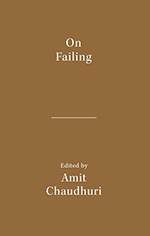The anthology, On Failing, edited by Amit Chaudhuri, is the outcome of a symposium on the same theme, organized in February 2020 as part of the Literary Activism project, which is currently run in partnership with Ashoka University. As the reader learns in the introductory material, Literary Activism brings to the fore conversations on creativity and creative processes that often spill over the disciplinary boundaries of Humanities. In an age dominated by neoliberal and capitalist values—where achieving success is both a measure and a mandate—On Failing invites readers to reflect on its antithesis: failure. As Amit Chaudhuri notes in his mission statement, ‘Failure has not only no dignity in the post-free market world we inhabit; it has no legitimacy, no vocabulary for self-appraisal.’ It is this lacuna that this anthology seeks to address by bringing together a diverse range of voices—including poets, novelists, academics, and more—who encourage the reader to critically and creatively engage with the concept of failure in order to understand its complex entanglements with desire, creativity, and present-day values.
The book begins with a powerful essay titled, ‘Suicide as a Sort of Failure’ by Clancy Martin, Professor of Philosophy at Ashoka University. Opening with a moving recollection of what appears to be his own suicide attempt, Martin explores societal perceptions of suicide as a form of failure, set against the psychological struggles faced by those who attempt it. Drawing on the works and experiences of David Foster Wallace and Édouard Levé, as well as his own, this essay intimately engages with emotions of fear, failure, shame, and cowardice/courage—all of which shape our understanding of suicide.
The next essay, ‘Description of a Poet’s Failure’ by Ranajit Das explores the paradox of creativity and life, noting that creative solitude—or, in some cases, the suffering of the artist—becomes a necessary premise for the creation of meaningful art, through a brief sketch of the life of the renowned Bengali poet Jibanananda Das. Along a similar trajectory, Sumana Roy’s ‘Failing Light’ analyses the correlation between creativity and failure, drawing on the recollections of the iconic Bengali filmmaker Satyajit Ray regarding the making of his renowned films such as Pather Panchali (1955), Kanchenjunga (1962), and others. Among other points, Roy suggests that negotiations with failure are an integral part of the creative process which produces what she calls an ‘aesthetic of provisionality, of contingency’. Roy also argues for the consideration of failure as a rasa within the navarasa of the Natyashastric tradition for the same reason. Echoing Das and Roy’s thoughts on the nexus between creativity and failure, but quite unlike them in its mode of engagement, is Lydia Davis’s narrative anecdote, ‘Learning to Sing’. Among the intense essays in this anthology, Davis’s entry is a welcome light read which recounts her seemingly simple experience of learning to sing.
Any reader who has relative familiarity with the Bollywood film industry is sure to enjoy the next entry in this collection featuring Bollywood filmmaker Anurag Kashyap. In this interview excerpt, Kashyap candidly narrates the creative backstory of some of his box-office successes and misses such as Dev D (2009), Udaan (2010), The Lunchbox (2013), Sacred Games (2018), Lust Stories (2018), and more. Through the glories and disappointments in his filmography—all of which included various negotiations between creative and political stances, and the commercial demands of the market—Kashyap disrupts one’s idea of Bollywood stardom and easy success.
Another interesting essay in the book is by the UK-based poet Tiffany Atkinson titled, ‘One Door Closes, Another Door Shuts’. Atkinson intertwines the personal and the political to explore how one understands and responds to failure. Drawing from her own struggles with intensely privatized IVF treatments which often leave one economically and emotionally exhausted, and the 2019 UK General Election where the Conservative Party won by a majority, Atkinson reflects on individual and collective experiences of failure. The essay powerfully argues that our conceptions of failure are insidiously tethered to what is referred to as ideologically motivated ‘good-life fantasies’. They are supported by complex socio-economic apparatuses that render any deviant way of being a failure. Atkinson encourages readers not to submit to such individual and collective neoliberal fantasies, but instead to claim agency and power outside of the political realm through alternative forms of being and collectivization.
Similarly, Amit Chaudhuri’s excerpt, ‘The Intimacy of Failing’ draws on childhood memories of his uncles. To Chaudhuri, his uncles—specifically his maternal uncle Radhesh, with his brilliant and eccentric mind—inhabited a curious realm that predated the value-laden, post free-market rhetoric of success and failure. The crucial yet forgotten, and often incongruous nexus between knowledge and desire is what the reader is asked to reclaim amidst contemporary anxieties surrounding failure and success.
A different approach to failure—what she refers to as ‘pure failure’—is taken by Sunetra Gupta in ‘User’s Manual’. Gupta notes that pure failure entails a state of awareness and even acceptance of one’s failure which may lead to generative and novel ways of living. Gupta is however keenly aware of the difficulty of this mode of acceptance within the logic of neoliberalism where the relief from failure is achieved only through success. The last entry in this anthology is by Michel Chaouli, Professor of German and Comparative Literature at Indiana University, Bloomington. Exploring the entanglements between falling and failing—separated only by an ‘I’ in the English language—Chaouli discusses their philosophical underpinnings on what it means to be human, drawing primarily from the work of philosopher Johann Gottlieb Fichte.
Broadly, On Failing is a refreshing and intellectually stimulating read for anyone seeking to make sense of their experiences of failure and, for that matter, of success.
Ann Susan Aleyas is Assistant Professor, Department of English, Jesus and Mary College, University of Delhi, Delhi.

